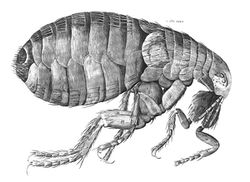Difference between revisions of "Antiparasitic Drugs"
Jump to navigation
Jump to search
| Line 8: | Line 8: | ||
}} | }} | ||
| − | + | [[Image: flea.jpg|thumb|right|250px|Robert Hooke's famous flea from Micrographia]] | |
As discussed on the [[Parasites|parasite]] pages of the site, disease caused by parasites can lead to a lot of damage to an individual animal and can lead to a massive reduction in productivity in the farmed species. Thus it is important to try and control parasites and to limit or more importantly stop their negative effects upon the host animal. | As discussed on the [[Parasites|parasite]] pages of the site, disease caused by parasites can lead to a lot of damage to an individual animal and can lead to a massive reduction in productivity in the farmed species. Thus it is important to try and control parasites and to limit or more importantly stop their negative effects upon the host animal. | ||
Revision as of 11:13, 30 October 2008
| This article has been peer reviewed but is awaiting expert review. If you would like to help with this, please see more information about expert reviewing. |
|
|
As discussed on the parasite pages of the site, disease caused by parasites can lead to a lot of damage to an individual animal and can lead to a massive reduction in productivity in the farmed species. Thus it is important to try and control parasites and to limit or more importantly stop their negative effects upon the host animal.
On these pages are discussed the drugs used to this effect. We shall discuss their mode of action, which species of parasite they effect and how best to use the treatments. We shall also address the growing problem of resistance to these drugs.
- Ectoparasiticides
- Anti-Protozoal Agents
- Anti-Helminths
- Antihelmintic Resistance
